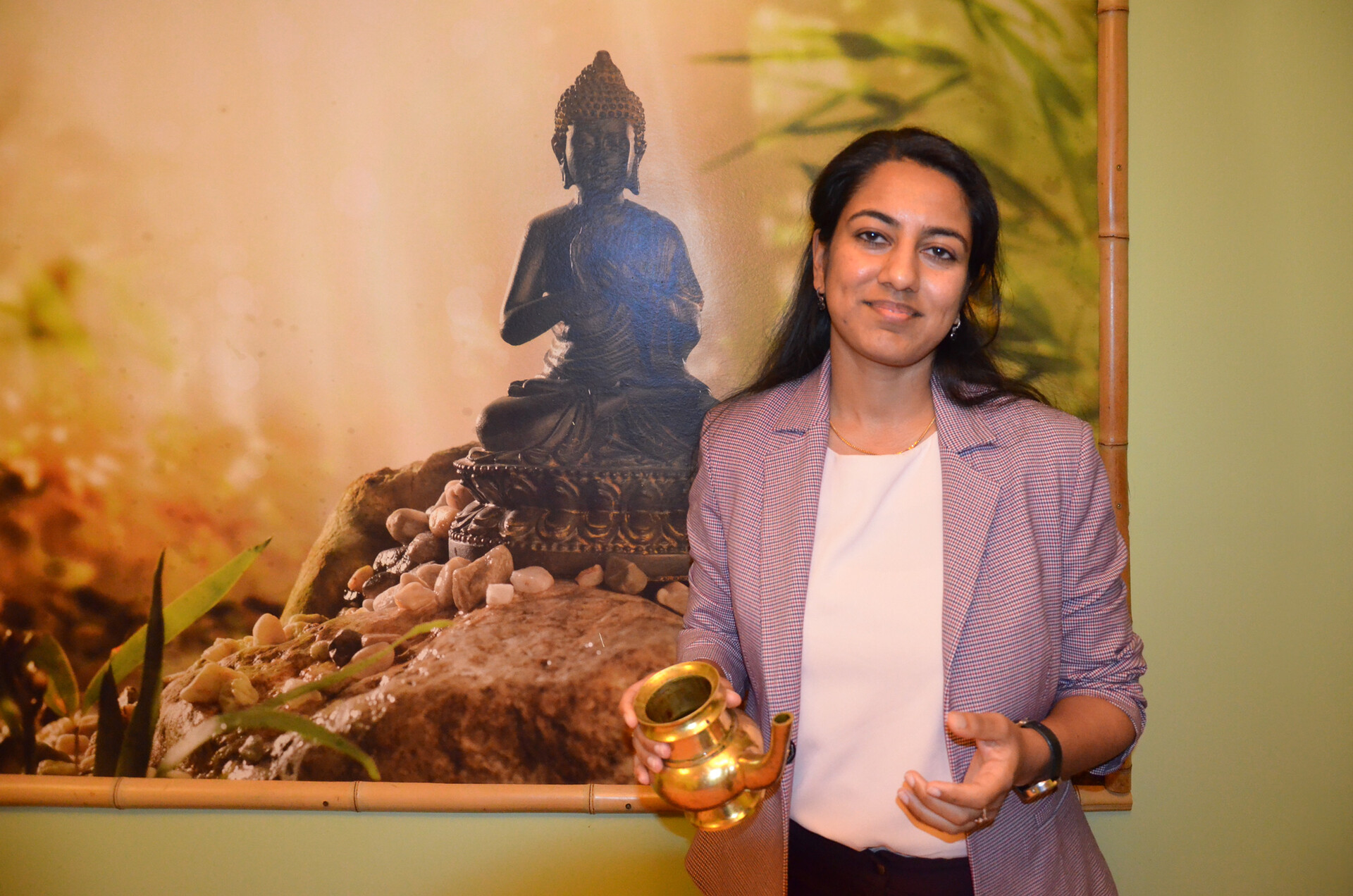
Dr. Medona Tomi
Personal archiveIn Russia, Dr. Medona Tomi is often asked what caste she’s from. She laughs at this question and responds that she’s a Christian – and Indian Christians don’t belong to any caste system. Her name is Medona, which derives from the word “Madonna” in reference to the Mother of Jesus Christ. Her Catholic mother gave her children biblical names, and in fact, Medona has a sister Maria and a brother Joseph.
The young woman grew up in the city of Alappuzha, or Alleppey, in the Indian state of Kerala. She has a bachelor’s degree in ayuverda and traditional surgery. Since 2019, she has been living in Saint Petersburg and working at the Ayurdara Ayuverda Center.
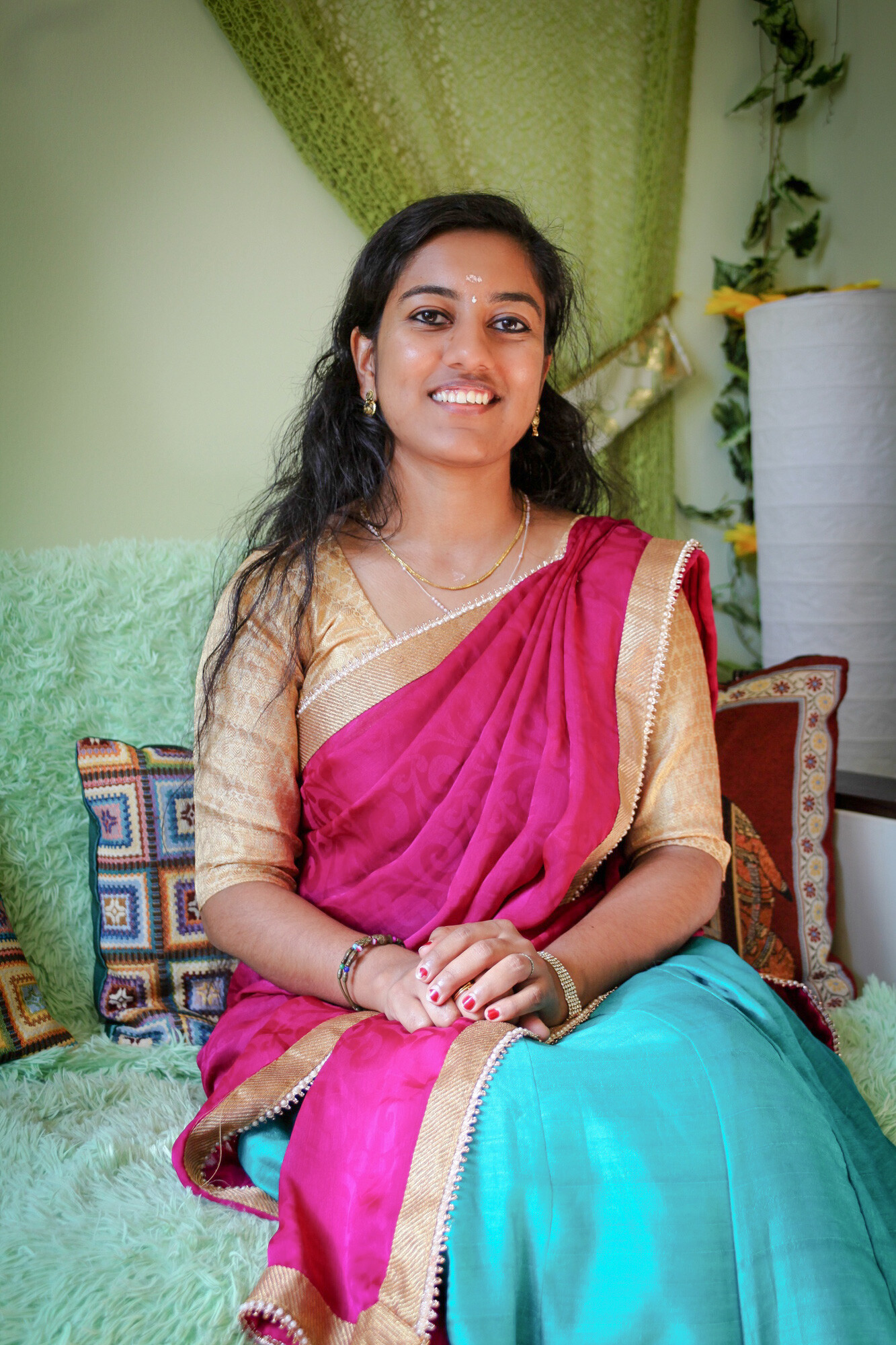
Medona in the national dress
Personal archiveBefore coming to Russia, Medona knew little about this cold, northern country. She had a matryoshka doll that was gifted to her in India by a Russian patient. She also saw pictures of Saint Petersburg’s raised drawbridges.
“I tried to imagine snow. I thought: what is it like by touch? How cold? What does it look like if you look at it up close? I came here in May; what snow would there be, one would think? And, suddenly, several days later, white flakes came down from the sky! It was a fluffy wonder – and my inner child was happy,” said Medona.
The young woman confesses that she came with an open mind, without any fears, preconceptions or expectations. Soon, however, she realized that to start a conversation with a stranger in Russia one has to put in more effort than in India. “But if you start talking, people will be ready to help you. Even if you don’t really understand each other.”
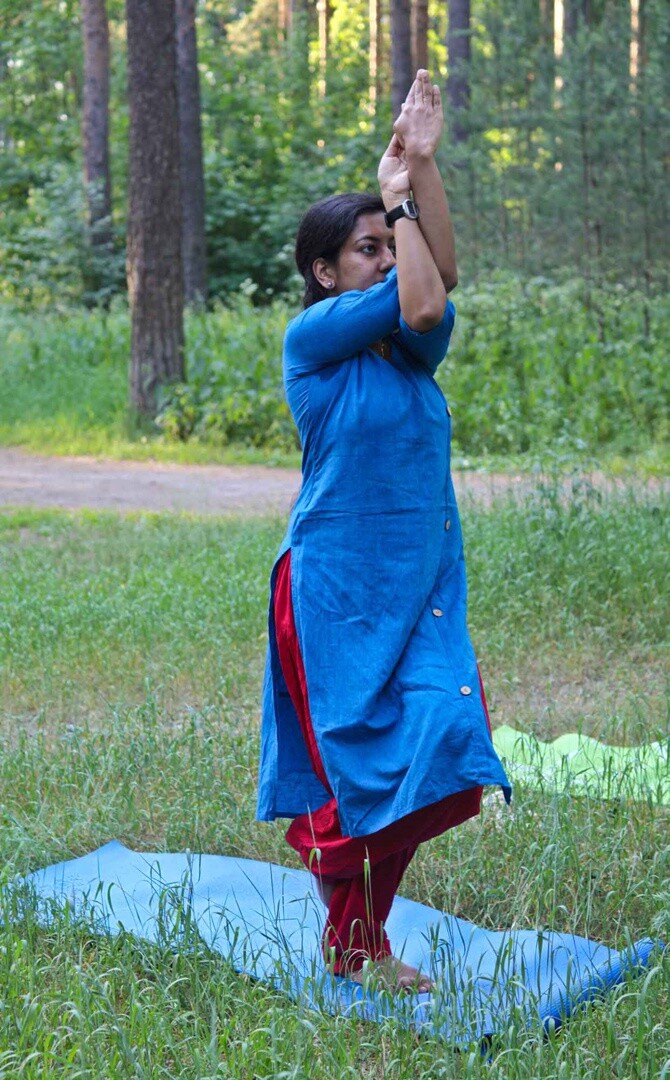
Outside yoga
Personal archiveAn actress, Kristina, became her first close acquaintance. Medona met her by chance in a cafe. Kristina asked her what time it was, and when she realized that Medona doesn’t speak Russian, she switched to English. “We became friends and walked around the city together. Thanks to her, I saw the real Saint Petersburg: the museums, theaters, and parks where people dance. I also saw the Swan Lake ballet. It was amazing!”
Medona says that in India people don’t walk around so much by foot: they get a bike, a tuk-tuk (an auto rickshaw) and go where they need to. “To walk in Saint Petersburg is something of a lifestyle, a tradition. I got used to it and now I also walk a lot. By the way, in India parents would have told their daughter at seven in the evening that it’s time to come back home, but here I spent as much time outside as I wanted and felt safe and independent.”
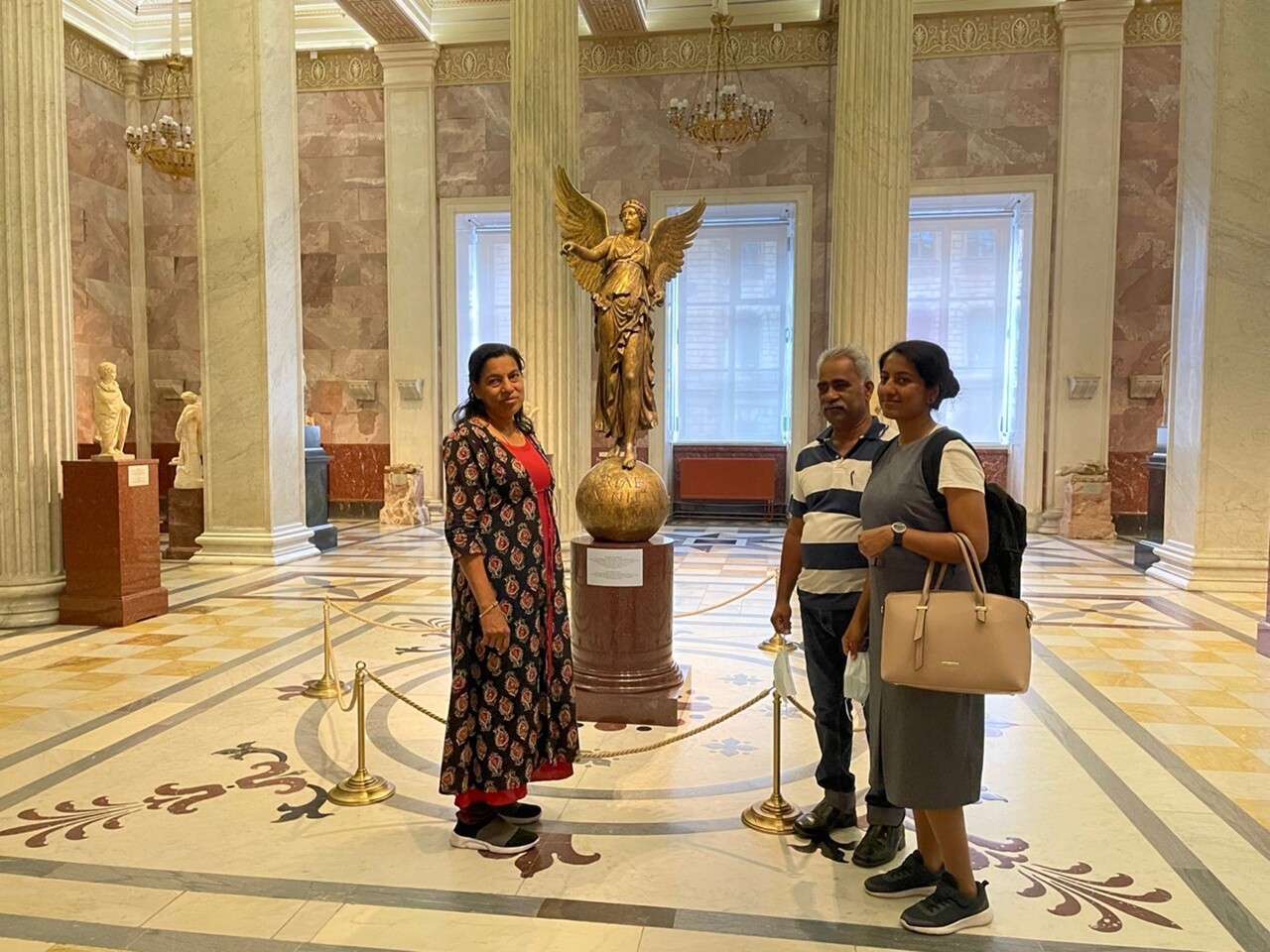
Medona and her parents in the Hermitage
Personal archiveMedona’s parents have already visited her in Saint Petersburg, and her brother plans to come next year. “My mom was surprised by everything: the berries, mushrooms, apple trees – she was amazed by all of it. She even took it all back home.”
Her father was more captivated by the architecture. “He had a bad knee, but he still walked a lot, one needs so much strength for the Hermitage alone! He even conquered the 200 steps to ascend the colonnade of St. Isaac’s Cathedral; it has, doubtless, the best view of the city.”
Also, Medona laughs and says that Russia has given her a husband. In fact, he’s her compatriot, also an ayuverda doctor and one of the directors of the center where the young woman works. “We met here, in St. Petersburg. When my parents came, he asked them for my hand in marriage.”
With its beauty and scale the imperial Petergof summer residence left a strong impression on Medona. She is also fascinated by Russia’s climate and the change of seasons. “In India, I would say, the weather is always the same, all the seasons are smudged together. Here I saw a colorful spring, a green summer, a golden autumn, and a white winter – it’s very beautiful!”
Medona has celebrated two Christmases and two New Years in Russia, and she was also surprised by these festivities. “Of course, I’ve heard about how Russians celebrate these winter holidays so festively and on such a large scale, but it’s one thing to hear about something and another to see the glowing garlands, snow, and people celebrating outside!”
Also, one other pleasant aspect of life in Russia is that Medona felt that here “equality between men and women is noticeable.”’
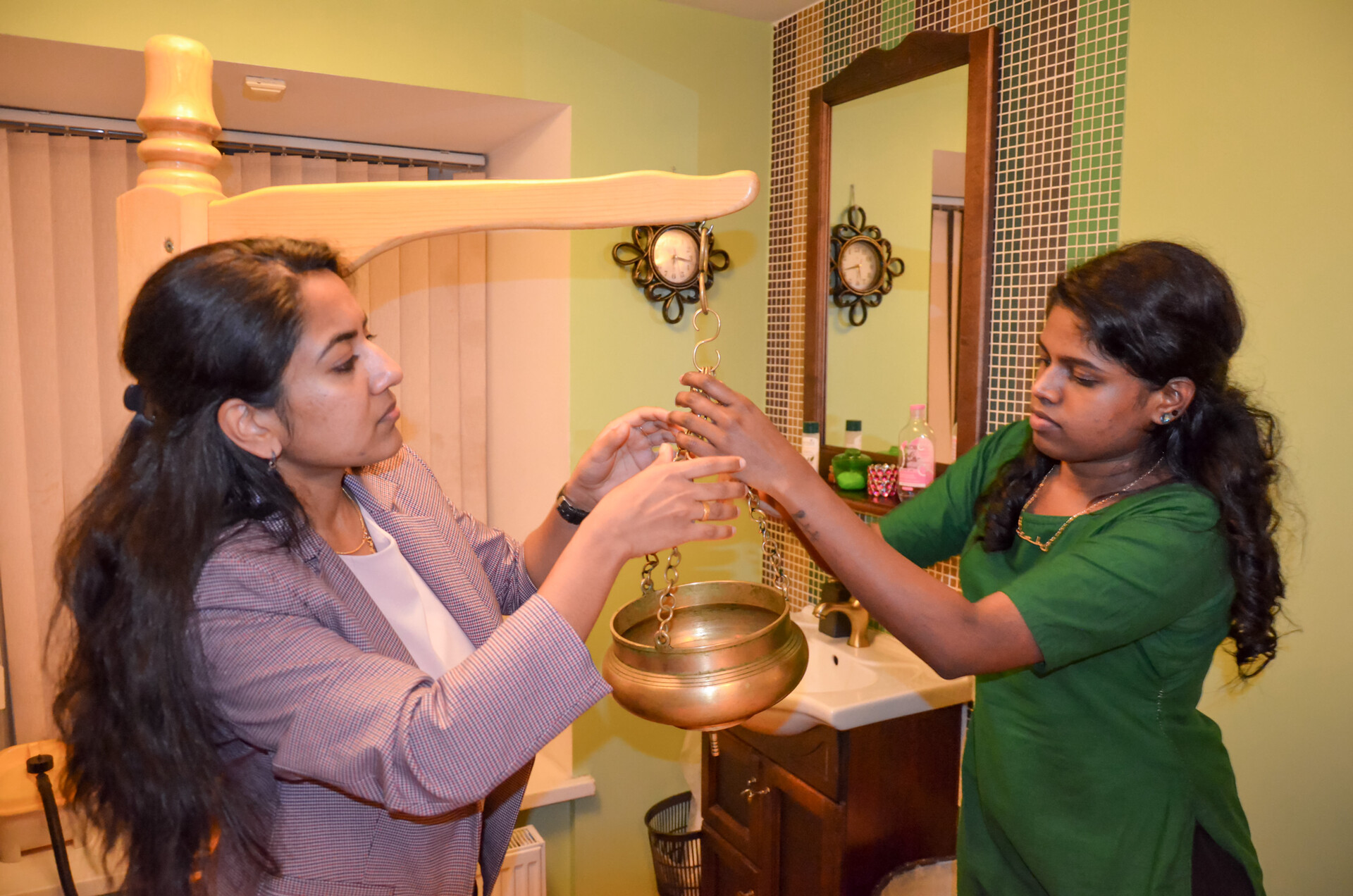
Dr. Medona (pictured left) at work
Personal archiveAyuverda is an ancient system of Indian medicine. As doctor Medona says, she doesn’t study organs separately, but rather, she looks at the entire human body as a whole.
Russian patients come to her most often with digestive and hormonal problems, as well as joint diseases. Lately, people have been spending too much time behind their computers – they are complaining about back pains.
“Indian patients have it, too, especially when it comes to digestive problems. Problems are the same everywhere. And for all of them there’s one simple answer: if you sleep well, if you eat properly, and try to keep your nervous system safe, everything will be fine.”
Russia differs with India, however, when it comes to problems related to stress and its consequences. Medona says that there’s a lot of stress in Russia, and this certainly impacts people’s health negatively.
“We're often too busy, we hurry, we run. We can’t hear ourselves. We need to stop and clearly define the problems that bother us. Then our brains will perceive these problems as tasks that need to be solved. And the brain will begin to solve them!”
“Now, when I come back to India, I automatically say ‘Hello’ to everyone in Russian,” Medona laughs.
Also, the young doctor has adopted unwritten Russian societal rules and traditions as her own: “I don’t shake hands over a threshold, I like buckwheat, and love mushrooms and berries. I learned how to make blinis and I continue to meet a lot of Russian people; it’s easy for me to talk to them, I understand them. You know what I think? We’re very similar.”
The full version of this article was originally published in Russian in Nation magazine.
Dear readers,
Our website and social media accounts are under threat of being restricted or banned, due to the current circumstances. So, to keep up with our latest content, simply do the following:
If using any of Russia Beyond's content, partly or in full, always provide an active hyperlink to the original material.
Subscribe
to our newsletter!
Get the week's best stories straight to your inbox